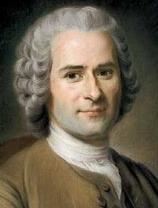 Tiberius Gracchus says, about Rousseau:
Tiberius Gracchus says, about Rousseau:He believed that man was a solitary animal to start with and then came together to form societies. Like Hobbes or Locke he believed in a state of nature.
Or that man was ‘good’ in a ‘state of nature’.
His argument was that in a state of nature, man had no self-consciousness, that civilisation and society were the products of the development of a self consciousness as a human being amongst other human beings and that that self-consciousness was inherently competitive.
And at the same time becoming increasingly dependent on them, moving from amour de soi [satisfaction with self] to amour propre [pride].
No problem up till here but then this Social Contract business gets in the way. If citizens are to rule directly and individuals must obey the ‘general will’, then who actually defines this ‘general will’? It’s a mare’s nest.
I have other objections too. Rousseau presupposes the capacity of all men to reason in order to participate in this process. But all men are not equal. There are women, babies, criminals, youths, the ignorant, the wise and the learned and by definition, certain types will rise and others mark time or fall.
He presupposes ‘goodwill’, stemming from ‘good nature’ and whilst he may be right to a point [Adam and Eve started in a state of nature], there is the other side to man. The humanist would say the dualistic nature of man and the Christian would say an external force for good and an external force for evil. Much is explained by the latter model.
This is why I accept Rousseau’s premise of ‘good nature’. It is the serpent who perverts it but it’s also society, as Rousseau said. To resolve this dilemma, there was already in existence the Olivet Discourse and Sermon on the Mount which provide excellent models to strive for in society, without any ‘forcing’ to the general will, so beloved of the left. They have yet to be surpassed.
Tiberius’ other point that ‘one gets the feeling that Rousseau's intellectual preoccupation was the explanation of Rousseau to Rousseau’ is also right on the money.
Interesting comment on Rousseau. I too have doubts about the General Will- personally I think that's what Orwell was attacking in 1984 and for me he blows it apart. I'm also not sure about the whole state of nature model- like Hume I tend to think that society in some ways grows out of human kind's familial impulses. The other thing I'd say though is that what I like about Rousseau is this realisation about the performance aspect of the individual- exactly what is a performance and what isn't is a difficult question but raising it is important and asking the question to what extent is a performance a lie is also key. Interesting article this isn't much of a response- I particularly by the way like the self satisfaction pride thing I was struggling for words to convey amour propre and amour de soi, and couldn't find them so settled for a convoluted expression- I do think he is aiming at something more communal than pride would allow but its good short hand.
ReplyDeleteHe's probably central to our dealing with society. I have a great deal of trouble with it and am getting worse. It's not that it's the people hee - it would be the same anywhere.
ReplyDeleteIt's other people wanting things which impinge on our space e.g. drilling in the wall doing repairs, loud music next door etc. And social occasions leave me cold. I could handle a Blogpower evening but other functions have me looking for the escape route.
Not unsocialized - just anti-social.